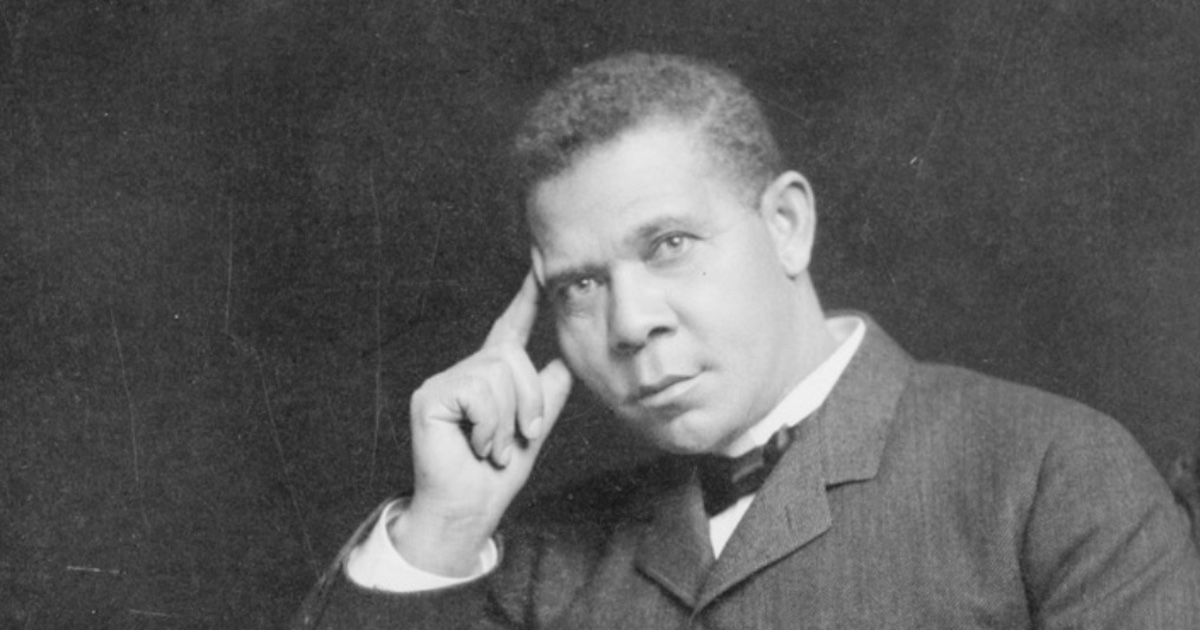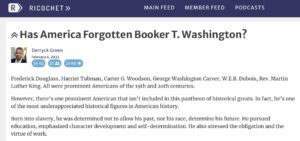
01 May 2022 Booker T. Washington: America’s Forgotten Hero
As a former slave who literally worked in the salt mines as a boy and went on to found one of the most famous black educational institutions in America, Booker T. Washington does not get the credit he deserves.

Project 21 member Derryck Green wrote that “he’s one of the most underappreciated historical figures in American history.”
Outlining Washington’s accomplishments in a commentary for the Ricochet Audio Network, Derryck added:
Born into slavery, he was determined not to allow his past, nor his race, determine his future. He pursued education, emphasized character development and self-determination. He also stressed the obligation and the virtue of work.
His ability to transcend enormous hardships saw him literally help build a school from the ground up. Though he repeatedly refused the temptation to become a politician, his record of personal and professional excellence enabled him to advise Presidents Roosevelt and Taft. Despite his extremely modest beginnings, he became an influential black intellectual and one of the foremost educators of his time.
Derryck noted that Washington is especially important because, in an era with fresh scars from slavery, he “stressed the nobility of work.”
Yet Washington is “excluded” from the praise bestowed upon other black historical figures of his accomplishment because of his “Atlanta Compromise” speech in 1895, Derryck explained. During a “cultural cauldron” of increasing racial animosity and growing violence, Washington’s “practical appeal to anxious southern whites and vulnerable southern blacks” was opposed by radical activists both then and now:
Washington affirmed in his address that blacks would forgo the pursuit of political power. He hoped this would alleviate the racial anxiety toward – and resentment of – blacks, among whites. In exchange, Washington recommended that whites not prevent blacks from seeking economic prosperity. Consequently, he exhorted the audience – filled with a mixture of blacks and whites – to “cast down your bucket where you are,” encouraging a mutual, socioeconomic interdependency among the races in the South.
“Was Washington’s speech a compromise?” Derryck asked. “Yes, but it was a very calculated and essential one that Washington felt necessary to protect the physical safety and economic interests of blacks.”
Derryck asserted that Washington’s ideas are “intentionally mischaracterized as capitulation,” and that his “advice is certainly needed now”:
Washington’s belief was that the transcendent values of personal responsibility – good character, hard work, education and self-determination were what first gained respect. Accordingly, freedom and equality would follow.
Sadly, Washington misjudged the racial hatred of southern whites. Subsequently, his vision of racial cooperation didn’t happen as he anticipated.
By controlling their fate, blacks will establish equality with their peers.
Read all of Derryck’s defense of Booker T. Washington at the website of the Ricochet Audio Network by clicking here.




